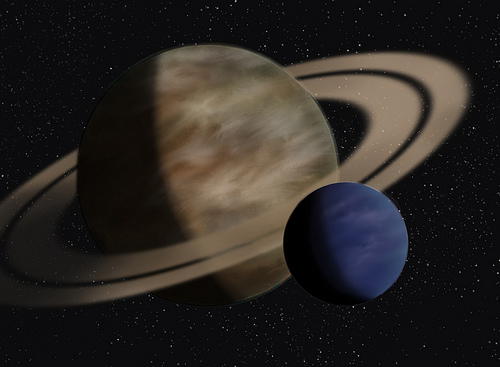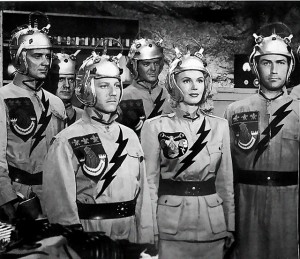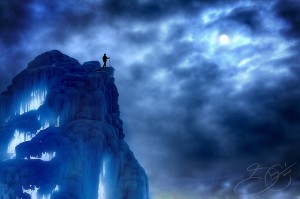I’ve been blogging about science fantasy for a time now but have never sat down with you and defined what science fantasy is. Hold onto your hat, here we go:
Science fantasy is a work of fiction that has elements of science fiction mixed with fantasy.

Blue Moon over Rings photo credit: BlackBirdCD via photopin cc
O, now that helpful, wasn’t it?
I think not. Let go back a bit to some other definitions.
The Definition of Science Fiction
Science fiction has extraordinary elements that can be explained by science, almost no matter how far-fetched.
Einstein postulated man couldn’t travel faster than light. That theory is no fun for stories set in the vastness of space. Most science fiction gets around this quickly but not through ‘magic’. Authors use things like hyper-space or sub-space or starburst or wormholes or even worm-spice as in Dune. Space and time are bended or flexed or inverted or sautéed. Things are explained at least with a loose science explanation.
Another definition: Science fiction has space ships, not dragons; it has aliens, not elves.

Science Fiction photo credit: x-ray delta one via photopin cc
Examples of pure science fiction: C.S. Lewis’s Space Trilogy, Doctor Who, The War of the Worlds, and Star Trek.
Though C.S. Lewis uses antiquated science (and once a book has made it though the long process of publishing, all its science is antiquated), his explanations of wondrous worlds are still grounded in science, not magic.
Doctor Who breaks the rules of physics right and left, but he uses scientific devices to do so, such as a Tardis.
H.G. Wells was too scientific minded to use any fantastic outs in his novels The War of the Worlds or The Time Machine.
Star Trek is unadulterated by fantasy, almost to the point of being lonely. Even the seeming supernatural ends up having a scientific basis. One cannot say the same for Star Wars, as we’ll discuss a bit further on.
The Definition of Fantasy
Fantasy’s fantastic elements are justified mostly through magic. We don’t have to deal with scientific explanations; we only have to swallow the pill that the supernatural exists.
And of course by definition, anything supernatural (super + natural) is outside the scope of science.
Now the fantasy story may have – and really should have – rules that apply to that magic. We’ve already discussed the problem of invincibility to a story. But explanations need not go into any dreary science.
Another way is to say: In fantasy, there be dragons… and dwarves.

Man on the Silver Mountain photo credit: country_boy_shane via photopin cc
Examples of pure fantasy: The Chronicles of Narnia, The Lord of the Rings, Grimm’s Fairy Tales, and Harry Potter.
I use C.S. Lewis again to show how an author with any imagination at all can easily switch from science fiction to fantasy. Lewis built Narnia as a world with boundaries and rules, there is an element of being grounded in a dimension a reader can understand. But in Narnia, fantastic creatures abound, deep magic coexists alongside humans.
I barely need to discuss J.R.R. Tolkien’s The Lord of the Rings, the 20th century’s quintessential fantasy work. The magic and creatures here are serious, and so is journey for heroes and readers.
Grimm’s Fairy Tales uses fantasy teach the moral lesson that good triumphs over evil even when against overwhelming odds. The same can be said for most fantasy.
J.K. Rowling updates these fairy tales in the Harry Potter series, but the same lesson is learned. Science is not considered but there is a moral science all the same.
The Definition of Science Fantasy
That brings us to science fantasy. Science fantasy blends scientific explanations with the presence of some supernatural power.
Examples of science fantasy: Star Wars, A Wrinkle in Time, Mark Twain’s A Connecticut Yankee in King Arthur’s Court, and my own Curious Origins of a Restless World.
Most people think of Star Wars as science fiction. But with the mysticism of the Force, this series falls squarely within science fantasy… notwithstanding the weird attempt to science-tize the Force in Episode 1 by midi-chlorians.
Madeleine L’Engle’s masterwork of A Wrinkle in Time adds savvy scientific explanations of space travel to mystical creatures named after questioning words. This book is a real trip.
Mark Twain used time travel, a science fiction sub-genre, to send his American hero back to the mythical land of Camelot. The idea worked, but most ideas did for Twain.
In my own book, Curious Origins of a Restless World, I take a plausible planet and possible creatures and mix in a smidge of the supernatural. That’s my own take on science fantasy. If you’re curious, sign up for updates and read the first story.
Or just check out the site.
So what’s your take on these definitions? Can you think of any further examples of science fantasy?


One science fantasy I loved as a kid was the Artemis Fowl books. There were very tech savvy elves.
Excellent example, Lucy.